

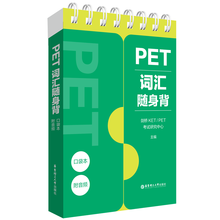
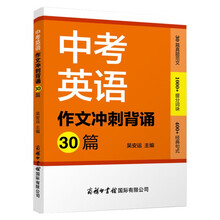
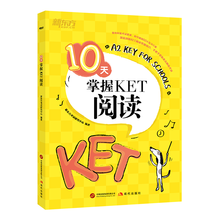
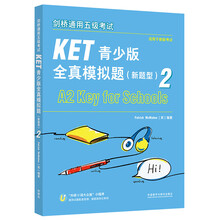
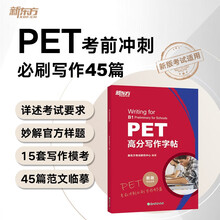
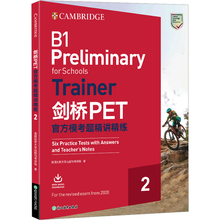
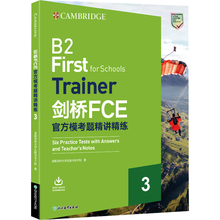
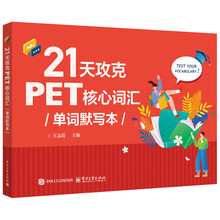
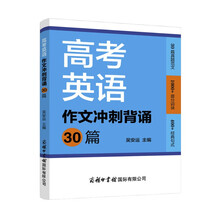
《新航道:SAT写作官方题库与范文(第3版)》优势及卖点:
1) 技巧大观、话题分类、素材扩展,为SAT写作铺平道路。
2) 完整收录146套2013-2006年新真题,打造强大的SAT写作真题题库;
另有《SAT官方指南》写作10题及模拟40题,尽享海量题库盛宴。
140篇原汁原味的范文,涵盖《SAT官方指南》写作20篇、新真题80篇及模拟40篇,学构思,品词句,尽握高分作文写作之道。
《新航道:SAT写作官方题库与范文(第3版)》主要包含七个章节:
第一章为备考简介,包含了如何使用本书、SAT Essay评分规则介绍、SAT Essay评分标准详解、SAT Essay写作流程四个部分,为处于不同阶段的考生介绍了使用本书的方法,详细分析了SAT Essay的评分规则和标准,并拆分讲解了SAT Essay写作流程的四个步骤。
第二章为技巧大观,首先从整体上介绍了文章的基本结构,然后分别针对首段、主体段和末段给出了相应的写作技巧,最后分析了名言、美句的仿写技巧,并提供了相应的扩展练习。
第三章为话题分类与范文精析,将SAT Essay写作题目大致分为了五类,分别回顾了五大类话题的SAT Essay写作题目,就相应的题目范文进行了详细讲解。
第四章为素材分类与扩展,将素材分为了五大类。每一大类都从相关题目着手精析了素材在写作中的具体运用,每一大类后面还提供了相关的扩展素材,帮助考生明确素材收集的范围和方向。
第五章至第七章分别为SAT Official Guide(简称OG)写作题及范文、2011-2006年新SAT写作真题及范文和SAT写作模拟题及范文。其中OG写作题为10道,每题配两篇参考范文,分别从不同的角度对题目进行阐述。而SAT写作真题部分共含80题,每题各提供一篇参考范文。最后为40道仿真度极高的SAT写作模拟题,每题附一篇参考范文。
书中提供的范文写作思路广而不散,语言流畅地道。考生既可以了解和掌握SAT写作考试的规律和趋势,也能够从范文中学习写作技法,汲取写作的灵感、素材、妙词佳句,为我所用。
另外,书中附录部分精选的2013年-2006年SAT写作真题则为考生提供了丰富的练习素材,有效帮助同学们学以致用,达到“Practice makes perfect”的学习境界,使备战更有效。
《新航道:SAT写作官方题库与范文(第3版)》在末尾还提供了全书真题索引,列出了书中所涉及的真题,并标注了其所在的页码,方便考生查找。
第六章 2011-2006年最新SAT写作真题及范文
2011年6月真题1
The essay gives you an opportunity to show how effectively you can develop and express ideas. You should, therefore, take care to develop your point of view, present your ideas logically and clearly, and use language precisely.
Your essay must be written on the lines provided on your answer sheet—you will receive no other paper on which to write. You will have enough space if you write on every line, avoid wide margins, and keep your handwriting to a reasonable size. Remember that people who are not familiar with your handwriting will read what you write. Try to write or print so that what you are writing is legible to those readers.
Important Reminders:
l A pencil is required for the essay. An essay written in ink will receive a score of zero.
l Do not write your essay in your test book. You will receive credit only for what you write on your answer sheet.
l An off-topic essay will receive a score of zero.
l If your essay does not reflect your original and individual work, your test scores may be canceled.
You have twenty-five minutes to write an essay on the topic assigned below.
Think carefully about the issue presented in the following excerpt and the assignment below.
People assume that every accomplishment— each step in what we call progress—will lead to the solution to a problem and will help them reach the goal of understanding themselves and the world around them. In reality, however, each new answer provokes additional questions and each fresh discovery uncovers further complications. Every accomplishment leads to further problems, added responsibilities, more complications, and new challenges.
Assignment: Does every achievement bring with it new challenges? Plan and write an essay in which you develop your point of view on this issue. Support your position with reasoning and examples taken from your reading, studies, experience, or observations.
Essay 1
Famous thinkers, from Albert Einstein to Albert Camus, have differed in their approaches to learning and life. But the one thing that most of these thinkers have always agreed on is that a person’s education is never finished, no matter how much they have learned and achieved. Scientists do not stop their research as soon as they have produced a notable invention or discovered a hidden phenomenon in our midst, because achievements are merely building blocks to a larger goal.
When I first began playing the piano, I was six years old and very precocious. However, I was also completely ignorant of music. Thus, my teacher Mrs. Biggs chose my repertoire carefully, starting me off with simple scales and music theory. After three lessons, she moved me on to arpeggios, chords, and finally, after eight lessons, melodic lines. Mrs. Biggs surprised me by saying I needed to pass a test first before she would let me learn “Mary had a little lamb,” everyone’s quintessential starter piece. However, dismayed as I was, what could I do? As her student, I was at her whim. One week later, after practicing for countless hours trying to memorize all that Mrs. Biggs had taught me over eight lessons, I answered all her questions and performed every command perfectly. Not bad for a six-year-old, I thought.
I thought my achievement would earn a reward, a cookie or a cake, some sweet treat. But when Mrs. Biggs produced the version of “Mary had a little lamb” she had wanted me to learn, I realized that my successful test had not been an achievement in and of itself. Rather, I was expected to use what I had learned in the previous eight lessons to execute my first piece of music—by sight-reading with both hands!
It took me a while to realize, but learning with Mrs. Biggs was a never-ending process. Every eight lessons or so would bring another test, which she not only expected me to pass perfectly, but would not reward me for learning. The reward would be a new piece to learn. After eleven years, I’ve progressed from scales to chords, to arpeggios, to major and minor keys, to waltzes, then sonatinas, then sonatas, rhapsodies, and now, the ultimate achievement—concertos. With music, there is always another piece that is technically more difficult, or musically more challenging.
Piano is only one area in my life in which I have learned that my achievements are never finite. It is tiring to slog through arithmetic in elementary school only to tackle algebra in middle school, then geometry, trigonometry, and calculus in high school. The same goes for grammar and writing. But I have learned to enjoy reaching goals and known that each goal only leads to larger ones. Once I have entered college that will no longer be my goal because my next challenge will be getting accepted to graduate school. As long as I am alive, I will always have more to achieve.
……
第一章 备考简介
第一节 如何使用本书
一、距SAT考试还有半年以上的考生
二、距SAT考试还有三至六个月的考生
三、距SAT考试还有一至三个月的考生
第二节 SAT Essay评分规则介绍
一、SAT 写作部分的分数构成
二、SAT Essay评分流程
三、SAT Essay分数转换
四、SAT Essay分数查看
第三节 SAT Essay评分标准详解
一、评分标准
二、文章评析
三、郑重提醒
第四节 SAT Essay写作流程
一、第一步:审题
二、第二步:构思
三、第三步:写作
四、第四步:检查
第二章 技巧大观
第一节 文章的基本结构
一、金字塔典型结构
二、金字塔范文分析
三、同题范文分析
第二节 首段技巧
一、个人经历法
二、现象描述法
三、争议法
四、引经据典法
五、问句法
六、比喻/类比法
七、开门见山法
八、引言法
第三节 主体段技巧
一、一段一例法
二、一段多例法
三、多段一例法
第四节 末段技巧
一、转折法
二、现象总结法
三、一锤定音法
四、引言法
第五节 名言、美句的仿写与扩展
一、名言、美句仿写技巧
二、名言、美句仿写补充练习
三、名言、美句分类集合
第三章 话题分类与范文精析
第一节 人生、成败类话题与范文
一、人生、成败类话题回顾
二、人生、成败类话题范文详解
第二节 创新、发展、科技类话题与范文
一、创新、发展、科技类话题回顾
二、创新、发展、科技类话题范文详解
第三节 道德、社会、教育、艺术类话题与范文
一、道德、社会、教育、艺术类话题回顾
二、道德、社会、教育、艺术类话题范文详解
第四节 个人、集体、权威类话题与范文
一、个人、集体、权威类话题回顾
二、个人、集体、权威类话题范文详解
第五节 媒体、英雄、名人类话题与范文
一、媒体、英雄、名人类话题回顾
二、媒体、英雄、名人类话题范文详解
第四章 素材分类与扩展
第一节 历史人物及事件类素材
一、历史人物及事件类素材精析
二、历史人物及事件类素材扩展
第二节 当代人物、时事、现象类素材
一、当代人物、时事、现象类素材精析
二、当代人物、时事、现象类素材扩展
第三节 理论、研究、书籍、故事类素材
一、理论、研究、书籍、故事类素材精析
二、理论、研究、书籍、故事类素材扩展
第四节 电影、电视、艺术类素材
一、电影、电视、艺术类素材精析
二、电影、电视、艺术类素材扩展
第五节 个人经历类素材
一、个人经历类素材精析
……